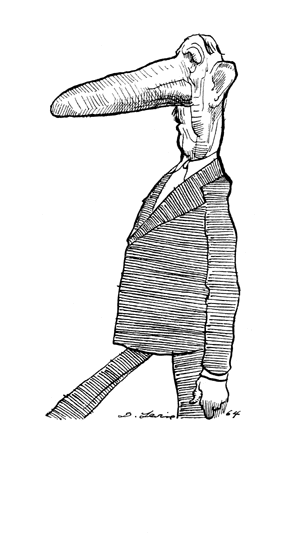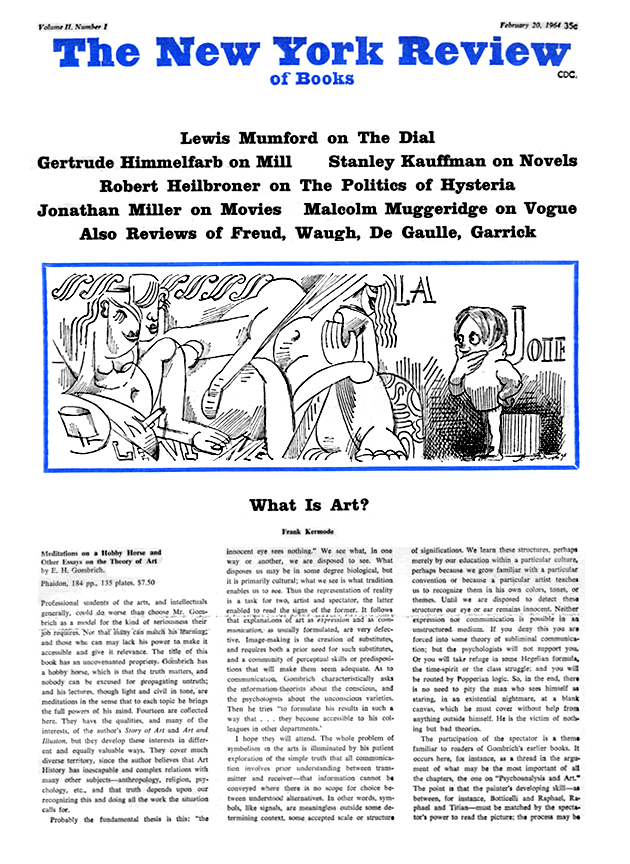In December, 1962, when this book was published in France under the title Haute-Cour, the government stupidly banned it on the ground that it constituted an insult to the President of the Republic. It would be too bad if official French heavy-handedness and the resentment created on this side of the Atlantic by De Gaulle’s foreign policy led readers here to overlook the bias in the book and the shortcomings of the author.
Fabre-Luce wrote at a time when De Gaulle seemed to be in trouble. The Algerian War was over, the old parties were getting impatient; it was not foolish to imagine that he would find himself pushed out of power just as he had been in the winter of 1945-6. Moreover, the move De Gaulle took to prevent a repetition of history at his expense—a revision of the Constitution by referendum—shocked many Frenchmen because of his stunning disregard of his own Constitution. Opposition to De Gaulle hardened, especially in the Senate, and although De Gaulle’s proposal won at the polls, the victory was not so impressive as the General had hoped. In these circumstances it was not difficult to imagine a future trial of Charles de Gaulle, comparable to the political trials that have kept the French excited and distracted for many years. Accordingly, Fabre-Luce imagined that the new Assembly elected after the referendum of October, 1962, had deposed the uncrowned King, and that under new laws De Gaulle could be tried by the Senate for abuse of authority. Unfortunately, the Assembly elected late in November, 1962, turned out to be heavily Gaullist. Fabre-Luce, undaunted, stated in his preface that French majorities have been known to dissolve or explode.
The Trial of Charles de Gaulle is a political pamphlet. Fabre-Luce describes it as “first and foremost a literary work.” This it certainly is not: Apart from a sprinkling of biting remarks about the fictitious spectators or the fictitious lawyer supposed to defend De Gaulle (Who remains contemptuously and conveniently silent), there is nothing in the book that shows a literary imagination at work. The Trial is merely a string of speeches: some are delivered by “real” witnesses, such as former Premier Guy Mollet—and all Fabre-Luce does is to quote from statements they have made or written; others are delivered by imaginary types, such as a member of the Conseil d’Etat, a diplomat and a psychiatric expert—but all Fabre-Luce does is to put in their months charges taken from newspaper articles or books, which he lists in an appendix. In other words, The Trial is not a novel: it is the Digest of anti-Gaullism.
Inevitably some of the charges are perfectly convincing. Fabre-Luce hits the target when he analyzes De Gaulle’s tendency to rewrite his past so as to erase contradictions, or when he shows the mixture of Cyrano and Machiavelli in the General. These arguments have been made for over twenty years; their truth does not make them any fresher. Nor is there anything original in another series of charges, which are both traditional and debatable: the unfairness of some of De Gaulle’s attacks against Vichy, the severity of the purges conducted in 1945, or the costs of the French nuclear striking force.
What is unique is the passion with which all those familiar stories are retold, and the indiscriminateness with which they are lumped together. Fabre-Luce’s resentment of De Gaulle is so deep that he fails to stick to his position of “impartial” spectator at his trial: the accusation dominates the trial and the book. Again and again he crosses the thin line that separates assertions from insinuations: he suggests that De Gaulle’s dislike of General Weygand was due to the latter’s crossing of De Gaulle’s name from a list of ministers prepared by Pétain in June, 1940—a highly fanciful account. Often he stumbles into the pitfalls of contradiction and inanity: he accuses De Gaulle both of stressing the Franco-German alliance too much, and of encouraging neutralism. The springs of Fabre-Luce’s resentment are not easy for the uninformed reader to discover: the author uses arguments that come from all directions. But he cannot conceal its origin entirely—the events of World War Two.
The Trial of Charles de Gaulle cannot be read out of context. It is boring to the foreign reader: what may be titillating or nostalgic to French readers who are avertis—a limited public of Paris afiçionados and provincial notables—will be confusing or numbing to most foreigners who are likely to think: So what? For with the passage of time the details of De Gaulle’s failings appear irrelevant as targets for attack. What matters, after all, is what he did. One does not have to be an admirer of the General’s style, of the General’s cunning, of the General’s rigidity, or of the General’s ego to recognize that he has served his country well. The lion’s fleas do not make him any less a lion, and to describe the fleas is a thankless task.
Advertisement
The Trial of Charles de Gaulle, if one reads it all, should be read as a double case study. First, it is a prize exhibit of the style of French political argument. French society is changing, yet there will always be Frenchmen who try to make the political wounds of the past bleed again. All they need is two weapons with which they are amply provided: one is venom (which loses its sting in translation); the other is a superb disdain for politics—defined as the art of the possible. Thus it is necessary to accuse one’s enemy of having achieved some bad results along with the good ones, as if the good and bad could always be separated; or to accuse him of not having done things that were completely beyond the reach of anyone, although they were conceivable in the recesses of one’s brain or on the surface of one’s writing pad. When venom and the art of unrealism are combined with stylistic flair and with the literary reflections of bourgeois classical culture and good manners, the results can be appealing. But Fabre-Luce’s book is too bitter and personal to be engaging.
For, in the second place, the book has to be read in the light of the author’s previous works. Some books can be divorced from their authors’ personalities or careers. This one cannot. Alfred Fabre-Luce, grandson on his mother’s side of the founder of the Credit Lyonnais and heir of a wealthy family of shipbuilders on his father’s side, belongs to that vast category of French bourgeois who would like the benefits of a liberal regime along with the advantages of being members of the élite, who willingly sacrifice liberalism to the restoration of order in times of social trouble, but who regret freedom soon after order has been restored.
In the 1930s, when the threat of social subversion had the face of Communism, Fabre-Luce was attracted by Fascist Italy and Nazi Germany. He flirted with Doriot’s Fascist Parti Populaire Francsais, but he did not join: the dilettante in him always won out; as he puts it in his recent memoirs (Vingt-Cinq ans de Liberté), he denounced the Republic all day but lived in its corruption at night. Moreover he was horrified by the idea of a new Franco-German war. In March of 1939 he started to keep a kind of political diary, later published as Journal de la France, in which he commented that if one let the Prussians loose on the Slavs, Descartes, Musset, and Brillat-Savarin would not suffer as a result!
When France fell, he favored “sincere” collaboration with the Germans, designed to make France either a partner in case of a German victory, or a force which the Anglo-Saxons could not neglect should the war go their way. He edited an Anthology of the New Europe in which he played at tasting the “new order,” baked in Berlin. But he gradually realized that his pet policy had been made impossible both by French resistance and by Nazi methods which the Liberal in him could not stomach. The man who had stated in 1940 that France had committed a crime against Europe in making war on Germany now wrote in his 1943 Journal about his disappointment—and was arrested, first by the Gestapo, later by De Gaulle’s police. His fate was both unkind and symbolic, for in a period when men were killing and dying for the causes to which they had devoted themselves, Fabre-Luce’s attitude had been that of the slightly detached commentator whose most singular gifts were poor judgment and bad timing whenever he temporarily committed himself. After the war, when many French conservatives who had once followed Pétain rallied around De Gaulle against Communism, it was Fabre-Luce’s turn to be intransigent and vindictive. The Trial is his third book aimed at the General since De Gaulle’s return to power.
One may ask whether an author who once admired Doriot and Hitler is a sound judge of “great men”; whether an author who once admired Laval’s policy of collaboration is qualified to speak of France’s demoralization by De Gaulle; whether an author who once admired the Fascist regimes is the best critic of De Gaulle’s violations of “legitimacy” and “continuity.”
Actually—if one should try to go to the roots of Fabre-Luce’s hostility, without resorting to the kind of personal insinuations he slips into—I find two sources of uneven importance. To Fabre-Luce, De Gaulle is the man who organized a resistance movement whose “center of gravity” (as he puts it) was on the Left, which did appear like a return of that Popular Front Fabre-Luce had fought, and whose ideology was egalitarian and anti-élitist. This is bad enough. What is far worse is that De Gaulle stands, rightly or wrongly, for French grandeur, and that Fabre-Luce is convinced that France’s role in the world must be modest and humble. Thus Fabre-Luce, who had wanted to “reach the postwar period” (i.e., European unity against Communism) “without the war,” has advocated an integrated Europe, whereas De Gaulle suspects that such a Europe would not be genuinely independent from outside protectors. Fabre-Luce has approved decolonization, but resents De Gaulle’s way of combining it with attempts at perpetuating French “presence” and prestige overseas. Fabre-Luce has recognized the need to readapt the French army to the modern world, but denounces indignantly De Gaulle’s nuclear ambitions, which have also that aim among others. After the defeat of France by Prussia in 1871, Renau told a young visitor: “France dies: do not disturb her agony.” Fabre-Luce’s ire has always been directed against the disturbers: Paul Reynaud in the Thirties, De Gaulle during the war, Mendès-France in 1954 (when Fabre-Luce wrote a book celebrating Pinay, who had been a mild Vichyite and who was a sound Conservative, as against Mendès-France’s “adventurism”), De Gaulle again since 1958.
Advertisement
Many people in this country will be delighted by Fabre-Luce’s indictment of De Gaulle’s diplomacy and by his warm support for American policies. The tone of the argument and the background of the author should make them a bit uncomfortable in their agreement. Also, they ought to remember that it was when too many Frenchmen followed Fabre-Luce that France went from disaster to disaster. In recent years it is De Gaulle they have followed. Many foreign friends of France regret it; but regrettable facts are no less facts, and have to be taken as the basis for policy; moreover, if the alternatives are De Gaulle’s appeal for grandeur and Fabre-Luce’s kind of resignation, the choice should not be hard to make.
This Issue
February 20, 1964



